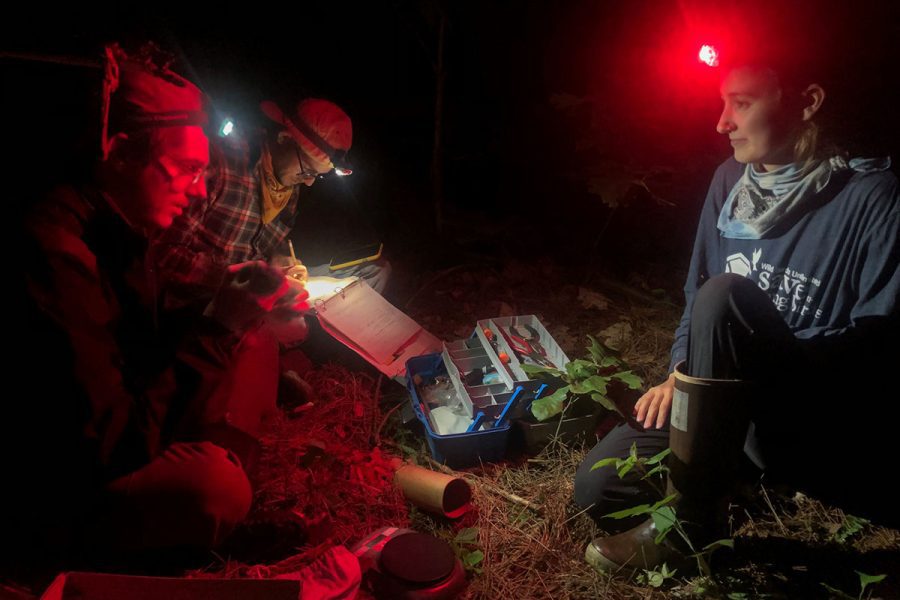Illinois student researcher leads efforts to preserve declining bird species
Photo courtesy of Kristen Malone/Illinois News Bureau
Sarah Stewart, graduate student in ACES, and her technicians banding a female whip-poor-will captured on a nest.
July 21, 2022
Sarah Stewart, graduate student studying natural resources and environmental sciences, trekked through the shrubbery and landscape of Sand Prairie-Scrub Oak Nature Preserve. Soon, she spotted a small bird on the ground in a nest — a whip-poor-will that had reached fledgling age. After gently handling the fledgling, she attached a radio transmitter to it so she would be able to easily locate it in the following weeks.
Monitoring whip-poor-will nests is a key component of Stewart’s research on the Eastern whip-poor-wills, nocturnal birds whose populations are declining. Stewart hopes that her research will help whip-poor-will conservation efforts since knowledge surrounding the species’ decline remains lacking.
“Pretty much any liberal research that’s being conducted right now is, in a way, just trying to understand even basic aspects of their life history because we don’t know,” Stewart said. “Because they’re cryptic, they’re definitely harder to study than a lot of diurnal birds.”
Some of the current theories that Stewart proposed regarding the population’s decline focus on declining food sources and increased predation due to the birds’ nest locations.
“There’s something about pesticide loads and soil that are potentially decreasing food resources, decreasing moth populations in these areas where they both used to live,” Stewart said. “They only really lay two eggs at one time, so it’s like they’re not able to lay enough eggs to compensate for the predation.”
Get The Daily Illini in your inbox!
Despite the small foundation of research surrounding whip-poor-wills, Stewart has been making headway regarding the examination of whip-poor-wills and their environments, leading to further questions to be considered about their decline.
Thomas Benson, professor in ACES and one of Stewart’s co-advisors, noted the manner of questions focusing on habitat limitation leads to questions on food resources, seemingly confirming decreasing food resources as a factor in the overall population decline.
“So when we’re capturing them and doing stuff with them, we put them in a little box that they defecate in, and we’re able to do genetic stuff on those to figure out what they’re eating,” Benson said. “It turns out moths are a really important food resource, and what we see based on that work is that there’s a really wide variation in the abundance of moths across Illinois forests, for example, and across a broader region, the Midwest as well.”
Stewart emphasized the importance of ensuring the whip-poor-wills’ survival due to their nature as an indicator species, meaning that changes within the whip-poor-wills or their behavior may signal certain changes or conditions within the greater ecosystem that the birds rely on.
“(In) an ecological sense, I think they are a great indicator species because they eat almost primarily just moths,” Stewart said. “If something’s wrong with the whip-poor-wills, and something seems to be up with them, it probably goes a lot deeper than that.”
Benson expanded upon the economic importance of the whip-poor-wills that accompanies the general public’s desire to help conserve declining animal populations.
“From an economic perspective, of course, there’s a lot of interest in birdwatching and so on as a recreational activity,” Benson said. “A lot of people (are) interested in going out and seeing different birds and what not.”
However, both Stewart and Benson highlighted the nostalgia and degrees of connection that the whip-poor-wills can bring up in people as well. Stewart mentioned that individuals she’s interacted with recall the “whip-poor-will” noise from childhood.
“Something really cool that I’ve realized since I’ve been working with them is that, almost every time I tell someone, maybe like a layperson not necessarily associated with the University or the research that I’m doing, the first thing they say is like, ‘Wow, I used to hear them all the time when I was a kid, but I haven’t heard them in years,’” Stewart said. “I think in terms of a cultural bird, they’re important, indicative of the countryside and farmland in the Midwest.”
Benson echoed many of Stewart’s comments, noting that he encountered individuals who expressed the same sense of connection with the whip-poor-wills. He likened this sense of connection to how other birds act as symbols of the arrival of a certain season or of sports teams such as the St. Louis Cardinals that people root for.
When considering a moment within her research that stands out, Stewart reflected on the opportunities to see the fledglings grow into full adulthood, emphasizing that witnessing the birds’ growth gives her hope despite the difficulties the populations face.
“I saw one of my fledglings that I tagged earlier in the season…look so much like an adult, just doing its thing, learning how to be a whip-poor-will,” Stewart said. “It gives me hope, right, that it’s like the processes are still there. There are still some birds that are able to succeed and reach independence.”
Stewart reiterated that she hopes individuals continue to recognize the importance of saving the whip-poor-wills as they learn more about their current condition.
“It just makes me more excited to share what I’m doing with the world and gives me, again, a little bit of hope for the whip-poor-wills if we can get all these people excited about them and thinking about them in terms of saving them and wanting to keep them around in the Midwest,” Stewart said.







